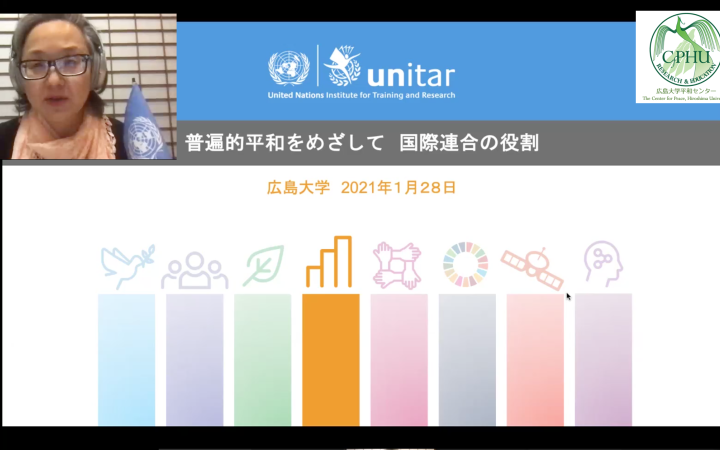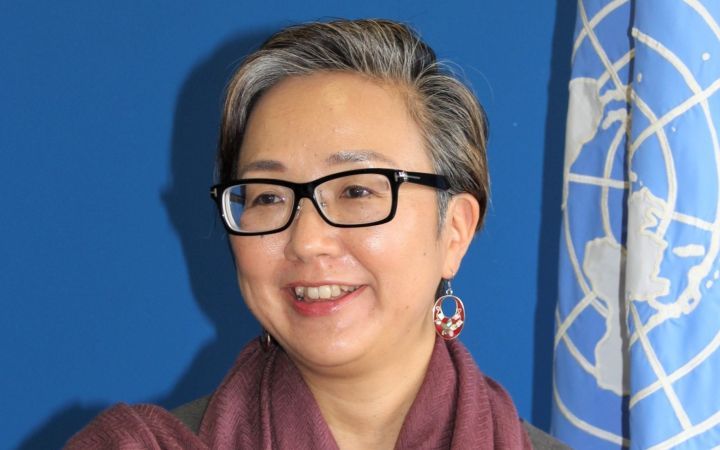Hiroshima University medical students encouraged to lead the way in a post-COVID-19 world
3 February 2021, Hiroshima, Japan - Among the many lessons gleaned from the COVID-19 pandemic is that our previous lives were neither environmentally nor economically sustainable. If we are to build an equitable and sustainable future, one that limits, if not eradicates, the potential for a similar crisis and ensures viable livelihoods for even the most vulnerable among us, we need not look farther than the Sustainable Development Goals (SDGs), which provides a valuable blueprint on which to build a post-pandemic world.
This was the heart of the message shared by Mihoko Kumamoto, Director of UNITAR Division of Prosperity, with medical students at Hiroshima University, as part of the university’s Aiming for Eternal Peace lecture series. The series brings together speakers from within and outside the university to explore the intersection of sustainability and peace. It helps students gain a broader perspective of international affairs to marry their medical expertise with a global perspective. The talk was presented virtually to more than 90 of the university’s students.
Kumamoto pointed out that, as future medical professionals, the students will be on the frontlines in dealing with the myriad of health issues – physical and psychological – resulting from the current pandemic.
“COVID-19, coupled with exponential environmental destruction caused by the climate crisis, an ever-deepening poverty chasm, and increasing conflict and migration, is reversing many of the gains achieved through the last 20 years,” noted Kumamoto. “As a result, we’re seeing more people fall below the poverty line, children from all walks of life losing valuable educational and socialization opportunities, increased gender-based violence, and already hard-hit vulnerable populations struggling against seemingly insurmountable odds. All of these factors will result in an increasingly stressed health system both here in Japan and abroad.”
While discussions of a similar nature are being held around the world, there is a vital resonance to the presentation being held in Hiroshima and an implicit challenge to the students.
“While it is important to remember that Hiroshima was the first city to be attacked and destroyed by the atomic bomb, it is equally valuable to recall that Hiroshima, like the phoenix, rose from the ashes to build a modern and resilient city,” noted Kumamoto. “An essential part of that rebirth was its transformation from a military centre to a global centre of peace. With SDGs as our guide, the same ingenuity with which we transformed the city can, and should, be used to help build our post-COVID-19 world.”
In her final words to the students, whom she thanked for their tireless efforts in addressing the pandemic in Japan, she encouraged them to be the change that is so essential to the future.
“We must not go back to our pre-COVID-19 lives. Instead, we must grab this opportunity and transition to a more sustainable way of life”, she said. “This means moving to a ‘new normal’, one that thinks holistically and always with the future in mind. The change needs to start with every one of us.”
About UNITAR Hiroshima
UNITAR is the only United Nations entity to establish a presence in the symbolic city of Hiroshima, in response to the desire of its people and authorities to contribute more actively to global peace and development. The Hiroshima Office has an inherent strength in the areas of peacebuilding, post-conflict reconstruction and disarmament as well as the broader themes of international peace and security. The Hiroshima Office develops and delivers focused and relevant needs-based training, including annual Fellowships and on-demand training programmes, in support of the Sustainable Development Goals, for a wide-range of beneficiaries.



